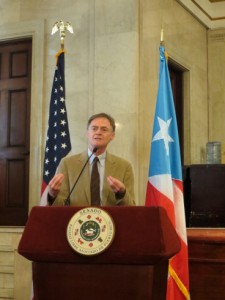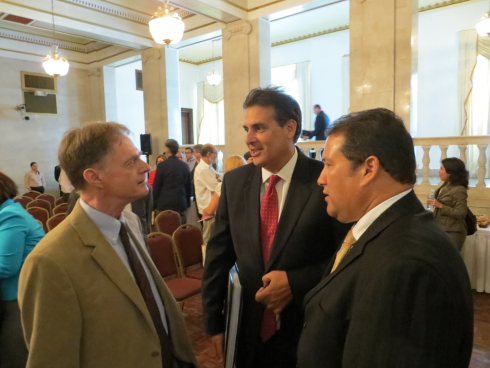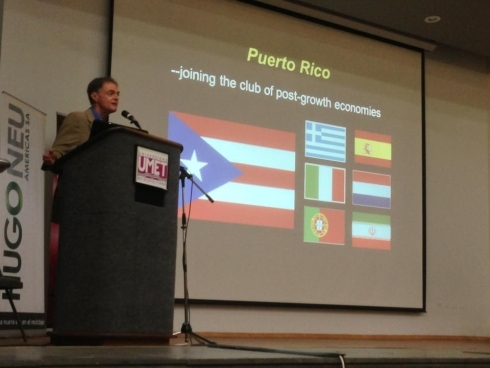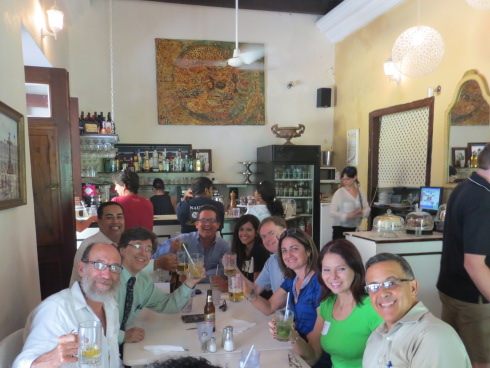The Puerto Rico Report
September 6, 2013
 I spent August 27 and 28 in San Juan, Puerto Rico at the invitation of María A. Juncos Gautier, Director of the Center for Sustainable Development Studies of the Universidad Metropolitana, with strong support from Dr. Carlos Padín, Chancellor of the Universidad Metropolitana.
I spent August 27 and 28 in San Juan, Puerto Rico at the invitation of María A. Juncos Gautier, Director of the Center for Sustainable Development Studies of the Universidad Metropolitana, with strong support from Dr. Carlos Padín, Chancellor of the Universidad Metropolitana.
Two presentations had been arranged for me in the city. The first, on August 27, took place in the Puerto Rican Senate, and was attended by several Senators, the President of the Senate, Hon. Eduardo Bhatia; key government departments’ top officials, like the Executive Director of the Puerto Rico Electric Power Authority, Juan Alicea; and an official representative of the Governor, Dr. Efraín O’Neill, Senior Advisor of the Governor of Puerto Rico in Energy. Roughly 50 people were in attendance.
The second presentation, on August 28, was at the College of Engineers and Land Surveyors, with engineers, architects, planners, economists and other well-placed folks present (about 100 total, all chairs filled). This was a more in-depth event, with a longer lecture from me plus panel discussions with local experts (Hon. Cirilo Tirado Rivera, Senator and President of the Commission on Energy, Natural Resources and Environmental Affairs of the Senate; Miguel Torres, Secretary of Department of Transportation and Public Works; José Maeso, Director of the Energy Affairs Administration of the Department of Economic Development and Commerce; and Dr. Efrain O Neill, Senior Advisor of the Government of PR in Energy. Altogether, the program ran from 9:30 to 3:30.
Broadcast media were in attendance at the events, and María arranged a full-page newspaper interview as well with El Nuevo Día, one of the largest and most important daily circulation newspapers in Puerto Rico.
Puerto Rico’s economy and population (currently at around 3.7 million, according to the 2010 Census) are shrinking and the island depends entirely on imported energy sources—including bunker oil for some of its electricity production, plus natural gas and coal. The Puerto Rico Electric Power Authority (PREPA) is a law unto itself, a monopoly that appears mismanaged (close to bankruptcy), autocratic, and opaque. Maybe these facts made my official audience more receptive than most I’ve encountered. I heard elected leaders making bold statements about the end of economic growth and the need to transition to a renewables-based economy.
Puerto Rico’s legal status as a US territory is a matter of ongoing political controversy: the island receives different types of benefits and funding from the US Federal government, Puerto Ricans don’t pay federal income tax and are represented by a locally elected Resident Commissioner every four years that has a voice but does not have a vote in Congress. Puerto Ricans cannot vote in US presidential elections, unless they move to the US mainland and become official residents in one of the states. Both statehood and full independence imply problems. The island’s economy depends largely on manufacturing and the service industry, most notably tourism, but the prospects for both are dismal. Over 80 percent of food is imported and the rate of car ownership is among the highest in the world (almost a car for each islander!). One way or another, major change is coming to the island.
What would Puerto Rico look like if policy makers started planning for the end of economic growth? Top priority would go to increasing domestic food production, best done on Permaculture farms taking advantage of the island’s climate. Transportation would move from current highway-automobile dominance toward increased use of bicycles, streetcars, and light rail—though an interim program of ride- and car-sharing could help with the transition.
Old San Juan is a gem of Spanish architecture with narrow cobbled streets, art, music, and food. It was a great pleasure, my last night in San Juan, to have the opportunity to savor several varieties of the island’s music and dance. The people of Puerto Rico are friendly and willing to think outside the box—and they know how to have a good time. They just need to escape the strangleholds of the current electric power monopoly, food-import dependency, and near-universal automobile ownership.
Altogether this was a remarkable and enjoyable visit. It will be interesting to see if there are continuing ripples from it.



